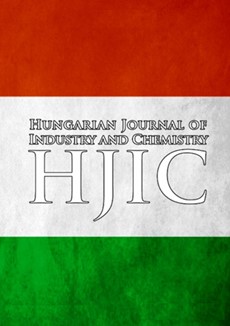Residence Time Distribution-Based Analysis of an Industrial-Scale Biogas Fermenter
DOI:
https://doi.org/10.33927/hjic-2019-19Keywords:
anaerobic digestion, mixing of digester, Residence Time Distribution, lithium tracing, Programmable Process StructuresAbstract
Residence Time Distribution (RTD) measurement-based analysis of mixing conditions on an industrial-scale (13,000) anaerobic digester of pressed sugar-beet slices at Kaposvár Sugar Factory of Magyar Cukor Zrt. was studied. The lithium salt tracing technique was applied, while the quantity of the lithium chloride tracer and the sampling of the effluent were designed by a preliminarily studied simulation model of mixing. The lithium concentration at the outlet was analysed by Inductively coupled plasma–optical emission spectroscopy (ICP-OES). Taking into account the geometrical arrangement, the biogas flow produced and the cyclically changing recycle flow, various mixing models were generated with different compartmentalization and flow structures by applying the method of Programmable Process Structures. The simulation-based approximate identification of the mixing model was accomplished by a heuristic approach that took into consideration multiple structures with changing mixing flows. A model with an advantageously small number of compartments and parameters was sought which satisfies the measured RTD. The results suggest the intensive mixing of upper levels with a poorly mixed lower level, which contributes to the long tail in the RTD. The actual set-up supports a good horizontal distribution of the sugar-beet slices and the microbial biomass, while the limited degree of vertical mixing helps to avoid the elutriation of the useful microbiome. The suggested mixing model will be combined with the formerly elaborated model involving 9 bacterial groups.Downloads
Published
2019-12-12
Issue
Section
Articles
How to Cite
Residence Time Distribution-Based Analysis of an Industrial-Scale Biogas Fermenter
. (2019). Hungarian Journal of Industry and Chemistry, 47(2), 43-51. https://doi.org/10.33927/hjic-2019-19




